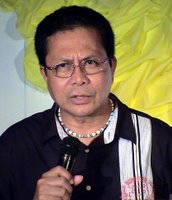 Mindanao solon favors shift to unicameral parliamentary form of Philippine government
Mindanao solon favors shift to unicameral parliamentary form of Philippine government text & photo HADER GLANG
House Deputy Speaker for Mindanao Abdulgani “Gerry” Salapuddin is in favor for a shift to a parliamentary system and unicameral parliament from the present bicameral presidential system of government.
“There are more opportunities in front of us if we can shift to parliamentary than stay in the presidential that is not really working,” said Salapuddin, who is now in his last term as congressman of the Lone District of Basilan.
Salapuddin made this statement of support during his 54th birthday celebration last Sunday, March 25, that was held at his fish farm in Buwalan, Sumagdang, Isabela City attended by supporters, including religious leaders and local government officials.
Salapuddin, a former Basilan-based MNLF commander turned politician, said one thing good in the parliamentary system is that there is a fusion or integration of the executive and the legislative, where the prime minister runs the day-to-day governmental affairs of the republic.
The Basilan lawmaker explained that under the system of Malaysia, Thailand, India and all other European countries to include United Kingdom, the president reins and becomes symbol but it does not govern.
“It is quicker to pass legislative measure in a parliamentary system because we only have one house, thus the conversions of Lamitan into a city and the Basilan State College into a university are faster,” according to Salapuddin.
Salapuddin joined senior House leaders and other pro-Charter Change in calling the abolition of the two-chamber legislature, which he described as a built-in mechanism for obstruction in the passage of bill.
“For as long as the Senate does not act on our bills it can never become laws even if it is urgently needed in the countryside or in our district. That is one problem commonly met in a bicameral (presidential) legislature.”
“But in a parliamentary system because you only have one house of parliament, the moment it is approved it only go to the president for signature but even if the president will not sign it after 30 days it becomes law.”
Meanwhile, Salapuddin said that the President, by freely sacrificing her popularity for Cha-cha, has shown her seriousness and determination to fulfill her campaign promise to push needed constitutional amendments during her incumbency.
He recalled that in 2004, the President "sacrificed her popularity for the economic reforms needed to address our fiscal deficit problem. That sacrifice paid off as we were able to sustain our budget deficit at a manageable level through improved tax collection and more savings through prudent spending."
He said the President’s action will have a positive impact on ongoing initiatives to push Charter change. "This will embolden and encourage more of our lawmakers, their constituents, and local executives to pursue Cha-cha whatever the odds."
Local officials on Monday launched a nationwide campaign, called the People’s Initiative and Referendum, to find out whatever is the pleasure of people and to enlighten them on the proposed specific amendments to the Constitution.(ZS)
No comments:
Post a Comment